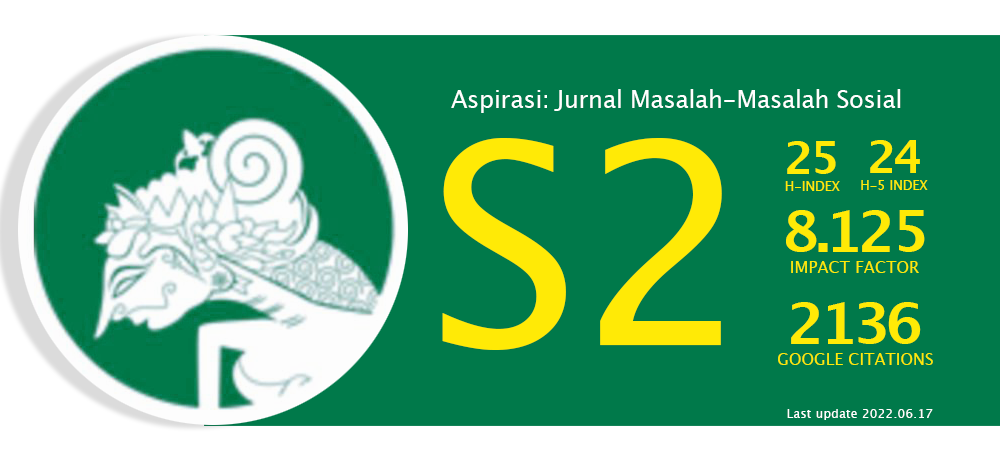Towards Advanced Tourism Development in Indonesia: A Critical Review of Free-Visa Policy
Abstract
Pada 2016, Pemerintah Indonesia menginisiasi kebijakan bebas visa bagi 169 negara untuk meningkatkan jumlah kunjungan wisatawan asing secara signifikan. Namun, pada 2018, parlemen merekomendasikan peninjauan kembali kebijakan tersebut. Hal ini mengingat potensi tindak pidana, baik kejahatan maupun pelanggaran, yang dilakukan oleh penerima bebas visa serta dampak signifikan terhadap penurunan pendapatan negara. Melalui pendekatan kualitatif, yang mencakup studi literatur dan analisis dokumen hukum, studi ini bertujuan untuk memberikan solusi alternatif terhadap kebijakan bebas visa di Indonesia. Studi ini menemukan bahwa (1) prinsip-prinsip utama dari kebijakan bebas visa di Indonesia adalah resiprokalitas dan prinsip manfaat; (2) kebijakan ini juga kurang didukung oleh justifikasi yang memadai dari negara-negara penerima, dan belum ada bukti empiris yang konklusif tentang dampak positif kebijakan tersebut terhadap peningkatan jumlah wisatawan asing ke Indonesia; (3) oleh karena itu, perlu penyempurnaan norma hukum terutama dalam peraturan keimigrasian untuk memastikan tujuan pemerintah selaras dengan prinsip-prinsip keamanan dan proteksi teritorial. Pembuat kebijakan perlu untuk mempertimbangkan penyesuaian Undang-Undang Keimigrasian agar harmonis dengan kebijakan bebas visa, demi mencapai tujuan strategis nasional tanpa mengesampingkan aspek keamanan dan kedaulatan negara.
Abstract:
In 2016, the Indonesian Government initiated a visa-free policy for 169 countries to significantly increase the number of foreign tourists visiting. However, in 2018, parliament recommended a review of the policy. This is considering the potential of criminal acts, both crimes and violations, by visa-free recipients and a significant impact on the decline in state revenue. Through a qualitative approach, which includes a literature review and legal document analysis, this study aims to provide alternative solutions to the visa-free policy in Indonesia. The study found that (1) the main principles of Indonesia's visa-free policy are reciprocity and the benefit principle; (2) this policy is also not supported by adequate justification from the recipient countries, and there is no conclusive empirical evidence of the positive impact of the policy on the number of foreign tourist to Indonesia; (3) therefore, need for refinement legal norm, especially immigration regulations, to ensure that government objectives are aligned with the principles of territorial security and national protection principles. Policymakers must consider adjusting the Immigration Law to be in harmony with the visa-free policy to achieve national strategic goals without overriding the security and sovereignty aspect of the country.
Keywords
Full Text:
PDFReferences
Ali, A., & Heryani, W. (2012). Menjelajahi kajian empiris terhadap hukum. Kencana - Prenada Media Group.
Antariksa, B. (2016). Kebijakan pembangunan kepariwisataan: pengembangan kepariwisataan yang berkelanjutan dan perlindungan kekayaan intelektual. Intrans Publishing.
Antariksa, B. (2022). Pengelolaan destinasi pariwisata: Konsep dan pengembangan kebijakan berorientasi jangka panjang. Empatdua Media.
Antariksa, B., Hamidah, S., Prihartini, R., Aqmarina, L., Hakim, I. N., Muttaqien, P. F., Asthu, A. A., Abdillah, D., & Astuti, M. T. (2018). Laporan penelitian bebas visa pariwisata. Kementerian Pariwisata.
Ardhiwisastra, Y. B. (2012). Penafsiran dan konstruksi hukum (3rd ed.). Alumni.
Artal-tur, A., Pallardó-lópez, V. J., & Requena-silvente, F. (2016). Examining the impact of visa restrictions on international tourist flows using panel data. Estudios de Economía, 43(2), 265–279. https://www.scielo.cl/pdf/ede/v43n2/art05.pdf
Ashdiana, I. M. (2013, January 23). Kemenparekraf: Indonesia kedepankan pariwisata berkualitas. Kompas. https://nasional.kompas.com/read/2013/01/23/10123580/menparekraf.indonesia.kedepankan.pariwisata.berkualitas
Badan Pusat Statistik. (2017). Perkembangan Pariwisata dan Transportasi Nasional Bulan Desember 2016 (21st ed.) [Berita Resmi Statistik]. Badan Pusat Statistik.
Badan Pusat Statistik. (2020, June 26). Statistik kunjungan wisatawan mancanegara tahun 2019. Badan Pusat Statistik. Retrieved June 16, 2024, from https://www.bps.go.id/publication/2020/06/26/94ceb011540bd0cd73e3474c/statistik-kunjungan-wisatawan-mancanegara-2019.html
Badan Pusat Statistik. (2021, October 20). Statistik Pengeluaran Wisatawan Mancanegara 2020. Badan Pusat Statistik. https://www.bps.go.id/publication/2021/10/20/edd8fc78594be9545eacc2c1/statistik-pengeluaran-wisatawan-mancanegara-2020.html
Bangwayo-Skeete, P. F., & Skeete, R. W. (2016). Who travels visa-free? insights into tourist hassle-free travel. Journal of Travel Research, 56(3), 407–418. https://doi.org/10.1177/0047287516643410
Baqi, A. M. (2018). Implikasi kebijakan bebas visa terhadap kejahatan perdagangan manusia di Indonesia. Journal of International Relations, 4(3), 479–488.
Browne, J., Coffey, B., Cook, K., Meiklejohn, S., & Palermo, C. (2019). A guide to policy analysis as a research method. Health Promotion International, 34(5), 1032–1044. https://doi.org/10.1093/heapro/day052
Calderwood, L., & Soshkin, M. (2019). The travel and tourism competitiveness report 2019. World Economic Forum’s Platform for Shaping the Future of Mobility. https://www3.weforum.org/docs/WEF_TTCR_2019.pdf
Chivanga, S. Y. (2016). Qualitative research methodology and numbers. Journal of Social Sciences, 47(2), 119–122. https://doi.org/10.1080/09718923.2016.11893551
Czaika, M., & Neumayer, E. (2017). Visa restrictions and economic globalization. Applied Geography, 84, 75–82. https://doi.org/10.1016/j.apgeog.2017.04.011
de Cuéllar, J. P. (1996). Global tourism: A genuine expression of our culture. In W. Nuryanti (Ed.), Tourism and culture: global civilization in change (pp. 50–58). Gadjah Mada University Press.
Edgell, D. L., & Swanson, J. R. (2013). Tourism Policy and Planning: Yesterday, Today and Tomorrow (2nd ed.). Routledge. https://doi.org/10.4324/9780203113332
Goeldner, C. R., & Ritchie, J. R. B. (2009). Tourism: principles, practices, philosophies. John Wiley & Sons, Inc.
Goto, T., & Akai, N. (2017). Benefit and cost of visa relaxation [Discussion Papers in Economics and Business 17–10]. Osaka University, Graduate School of Economics. https://ideas.repec.org/p/osk/wpaper/1710.html
Heft, J. R. (2016, September 7). 9/11 Attacks 15 years later: A look at losses by the number. PropertyCasualty360. https://www.propertycasualty360.com/2016/09/07/9-11-attacks-15-years-later-a-look-at-losses-by-th/?slreturn=20230920005536
Hudman, L. E., & Hawkins, D. E. (1989). Tourism in contemporary society: An introductory text. Prentice Hall.
Indrady, A. (2020). A critical assessment on the Indonesian free visa policy: A neorealist perspective. Global: Jurnal Politik Internasional, 22(1), 54–76. https://doi.org/10.7454/global.v22i1.414
International Monetary Fund. (2021). Countries by projected GDP per capita. StatisticsTimes.com. https://statisticstimes.com/economy/countries-by-projected-gdp-capita.php
Irfani, N. (2020). Asas lex superior, lex specialis, dan lex posterior: pemaknaan, problematika, dan penggunaannya dalam penalaran dan argumentasi hukum. Jurnal Legislasi Indonesia, 17(3), 305–325. https://doi.org/10.54629/jli.v17i3.711
Jazuli, A. (2016). Implementasi kebijakan bebas visa dalam perspektif keimigrasian. Jurnal Ilmiah Kebijakan Hukum, 10(3), 211–225.
Jennings, G., Lee, Y. S., Ayling, A., Lunny, B., Cater, C., & Ollenburg, C. (2009). Quality tourism experiences: Reviews, reflections, research agendas. Journal of Hospitality and Leisure Marketing, 18(2–3), 294–310. https://doi.org/10.1080/19368620802594169
Jokowi: All ministries must support the tourism sector. (2015, February 17). Tempo.co. https://en.tempo.co/read/643033/jokowi-all-ministries-must-support-tourism-sector
Kementerian Koordinator Bidang Politik, Hukum, dan Keamanan Republik Indonesia. (2018). Paparan dalam rangka Rakor Evaluasi Kebijakan Bebas Visa. Kementerian Koordinator Bidang Politik, Hukum, dan Keamanan Republik Indonesia.
Knight, A. (1996). Spies without cloaks: The KGB’s successors. Princeton University Press.
Komisi III DPR RI. (2017, Januari 19). Laporan Singkat Rapat Kerja Komisi III DPR RI dengan MENKUMHAM Republik Indonesia. Komisi III DPR RI. https://berkas.dpr.go.id/akd/dokumen/K3-14-b6ef5d37af88f143fad32d666b9bcf3e.pdf
Kustiani, R. (2019, November 23). Wishnutama sebut pariwisata berkualitas, apa maksudnya. Tempo.co. https://travel.tempo.co/read/1275637/wishnutama-sebut-pariwisata-berkualitas-apa-maksudnya
Luedtke, A., Byrd, D. G., & Alexander, K. P. (2010). The politics of visas. The Whitehead Journal of Diplomacy and International Relations, 81(1), 147–162. https://ciaotest.cc.columbia.edu/journals/shjdir/v11i1/f_0029185_23683.pdf
Mak, J. (2008). Developing a dream destination: Tourism and tourism policy planning in Hawai‘i. University of Hawaii Press.
McKercher, B. (2018). The impact of distance on tourism: a tourism geography law. Tourism Geographies, 20(5), 905–909. https://doi.org/10.1080/14616688.2018.1434813
Muhaimin. (2020). Metode penelitian hukum. Mataram University Press.
Nasution, J. B. (2008). Metode penelitian ilmu hukum. CV Mandar Maju.
National Statistics Office of Thailand. (2023). 17 Tourism and Sports Branch. statbbi.nso.gov. http://statbbi.nso.go.th/staticreport/page/sector/en/17.aspx
Neumayer, E. (2010). Visa restrictions and bilateral travel. Professional Geographer, 62(2), 171–181. https://doi.org/10.1080/00330121003600835
Nugroho, T. W. A. (2017). Optimalisasi peran timpora pasca berlakunya Peraturan Presiden Nomor 21 Tahun 2016 tentang Bebas Visa Kunjungan. Jurnal Ilmiah Kebijakan Hukum, 11(3), 263–285.
Parker Waichman LLP. (2020, June 18). The Fatalities of 9/11 Terrorist Attacks: Then and Now. Parker Waichman LLP. https://www.yourlawyer.com/library/911-terrorist-attacks-fatalities/
Peers, S., Guild, E., & Tomkin, J. (2012). Visa facilitation. In S. Peers, E. Guild, & J. Tomkin (Eds.), EU Immigration and Asylum Law (Text and Commentary): Second Revised Edition: Volume 1: Visas and Border Controls (pp. 315–336). Brill. https://doi.org/10.1163/9789004222373_010
Peraturan Presiden Nomor 21 Tahun 2016 tentang Pelaksanaan Bebas Visa Kunjungan. (2016).
Purwati, A. (2020). Metode penelitian hukum: Teori dan praktek. CV Jakad Media Publishing.
Salim, H. S., & Nurbani, E. S. (2014). Penerapan teori hukum pada penelitian tesis dan disertasi (2nd ed.). PT. RajaGrafindo Persada.
Setiadi, W., & Afrizal, R. A. (2019). Implikasi kebijakan bebas visa berdasarkan Peraturan Presiden Tentang Bebas Visa Kunjungan: Perspektif ketenagakerjaan. Jurnal Ilmiah Kebijakan Hukum, 13(3), 311–322. https://doi.org/10.30641/kebijakan.2019.v13.311-322
Shietra, H. (2019, July 15). Aturan hukum boleh bertentangan dengan norma hukum yang lebih tinggi, sepanjang belum dibatalkan: Ambiguitas Hukum dalam Praktik Hukum-hukum.com. https://www.hukum-hukum.com/2019/07/aturan-hukum-boleh-bertentangan-dengan-norma-lebih-tinggi.html
Sørensen, F., & Grindsted, T. S. (2021). Sustainability approaches and nature tourism development. Annals of Tourism Research, 91, 1–14. https://doi.org/10.1016/j.annals.2021.103307
Sugiyono. (2007). Memahami penelitian kualitatif. CV Alfabeta.
Ţîţu, M. A., Răulea, A. S., & Ţîţu, S. (2016). Measuring service quality in tourism industry. Procedia - Social and Behavioral Sciences, 221, 294–301. https://doi.org/10.1016/j.sbspro.2016.05.118
Tohardi, A. (2020). Model penelitian kebijakan kualitatif “Tohardi". JPASDEV Journal of Public Administration and Sociology of Development, 1(1), 58–77. https://doi.org/http://dx.doi.org/10.26418/jpasdev.v1i1.41615
United Nations World Tourism Organization. (2018). Visa openness report 2018 [PPT]. United Nations World Tourism Organization. https://webunwto.s3.eu-west-1.amazonaws.com/2019-07/2018visaopennessreport_sm.pdf
United Nations World Tourism Organization. (2020). International tourism highlights 2019. United Nations World Tourism Organization. https://www.e-unwto.org/doi/epdf/10.18111/9789284422456
Verma, T., Rebelo, L., & Araújo, A. A. M. (2019). Impact of perceived distances on international tourism. PLoS ONE, 14(12), 1–16. https://doi.org/10.1371/journal.pone.0225315
Waluyo, D. (2017, Februari 20). Indonesia kejar target 30 persen penumpang internasional. InfoPublik.id. https://infopublik.id/kategori/sorot-ekonomi-bisnis/415606/indonesia-kejar-target-30-persen-penumpang-internasional
World Population Review. (2021). Best Healthcare in the World 2021. World Population Review. Retrieved 2021, from https://worldpopulationreview.com/country-rankings/best-healthcare-in-the-world
World Population Review. (2022). Unemployment by country 2024. World Population Review. Retrieved 2022, from https://worldpopulationreview.com/country-rankings/unemployment-by-country
World Travel and Tourism Council. (2019). Visa facilitation enabling travel & job creation through secure & seamless cross-border travel. Tourism Knowledge Center. https://tourismknowledgecenter.com/publication/visa-facilitation-enabling-travel-job-creation-through-secure-seamless-cross-border-travel
DOI: https://doi.org/10.46807/aspirasi.v15i1.3822
Refbacks
- There are currently no refbacks.








